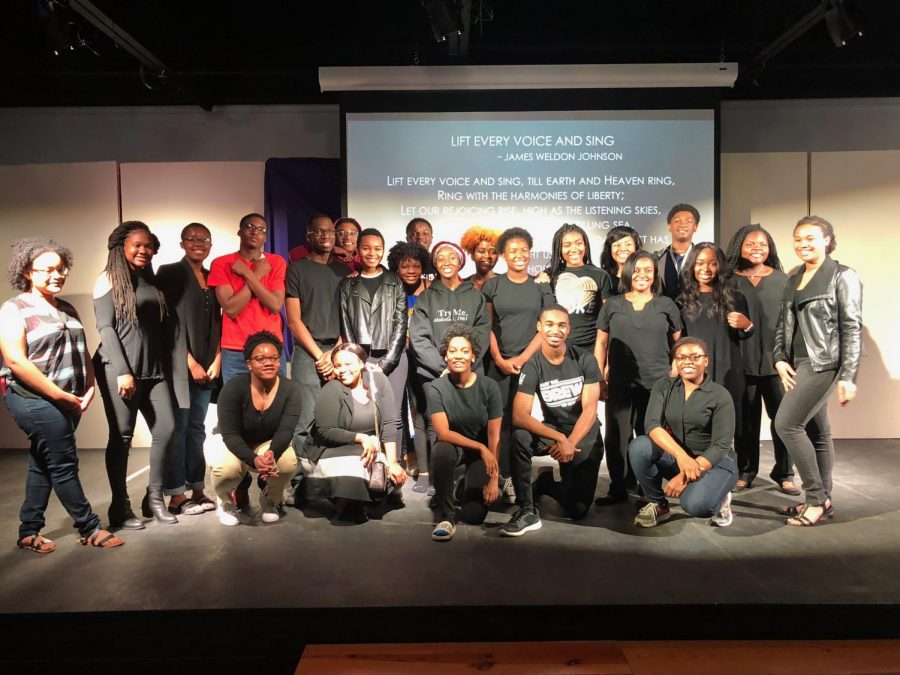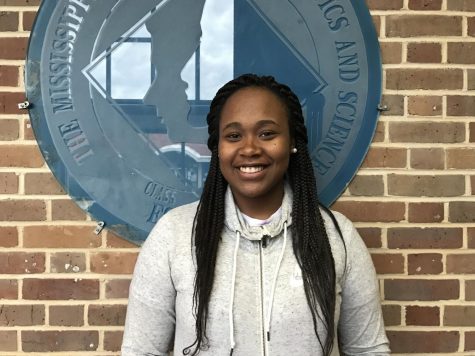The Black Student Alliance Black History Program
At the end of the Black History Program, all of the participants gathered on stage for a group photo.
March 5, 2018
Even though February is over, black history continues to be acknowledged and celebrated. On Thursday, March 1, BSA hosted its first Black History Program in Shack Auditorium. Through a variety of skits, songs and impressions, lots of knowledge was spread to teachers, students and people of the community.
The program started with a welcome from BSA’s President Amber Jackson, followed by a tribal dance. The dance was performed by both seniors and juniors with most of them being a part of the step group Blu Knights and Blu Diamondz.
Junior Trinity Cannon mentioned, “The African dance helped many of us have fun and connect with each other through our ancestral dances.”
Next, Kerrigan Clark and Ezra McWilliams portrayed W.E.B Du Bois and Booker T. Washington and performed their debate, “Same Goals Different Ideas.”
Junior Ezra McWilliams shared, “Our segment was about two men with a common goal of bringing equality to the Negroes, but had different ways going by it. It was if they were night and day.”
The Harlem Renaissance was the next presentation during the program. Starting it all off, Aaron Montgomery delivered “The Negro Speaks of Rivers” by Langston Hughes. Amber Jackson then spoke “Harlem Shadows” by Claude McKay. Lastly, Tija Johnson passionately presented “For My People” by Margaret Walker.
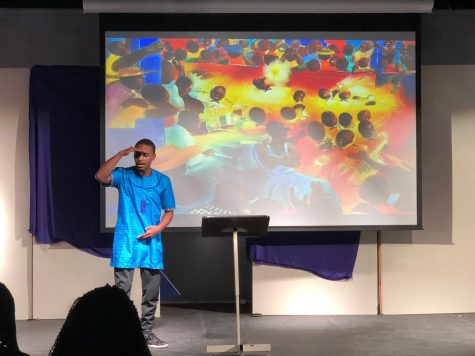
Aaron Montgomery presents “The Negro Speaks of Rivers” by Langston Hughes.
Jackson commented, “We really wanted to capture the essence of how the Harlem Renaissance was an important intellectual and artistic period that was crucial to forming the future culture and confidence of African Americans.” She also added, “It was this movement showed African Americans in a different light other than free slaves being uneducated, uncivilized, and uncultured. I think getting to portray these amazing people, like W.E.B Dubois, Langston Hughes, Claude Mckay and Booker T. Washington, was really important because it honored the creation and excellence of African American literary, musical and cultural history in America.”
To represent the chronicles of the Civil Rights Movement, senior Ta’Kiya Moore developed the idea and gathered a few students to help portray different roles. They did two scenes on being in a segregated bus station and the other inside a jail.
Moore shared, “Through the ‘Jalied’ scene, I wanted to emphasize the persistence of the Freedom Riders who were arrested for fighting for the rights of African Americans.”
DeMya Fleming did an impression of Angela Davis and shared some of the things that she accomplished in black history.
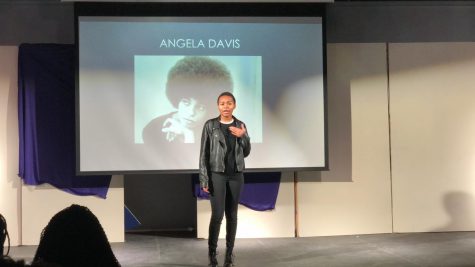
DeMya Fleming does an impression of Angela Davis. Fleming gives a brief overview of all the things Davis did in history.
“Writing the speech for Angela was actually something i enjoyed. When it actually came down to saying it in front of people, that was the problem. I have a fear of speaking in front of people, but I ended up enjoying it anyway,” Fleming said.
Dr. Tylon Crook, BSA’s advisor, expressed, “The new student organization, Black Student Alliance, worked diligently to make this event happen! I was ecstatic to guide these very bright and motivated MSMS students as they sought to celebrate Black History.” He added, “Many in our society, and even our school, question the relevance or need for a ‘Black History Month,’ but I am resolute in my belief that the history of African Americans be told and celebrated often in light of so much history that is intentionally and unintentionally not taught in our schools. From the event, BSA members were definitely motivated to study history year round, and it was my hope that attendees were able to learn something they may not have otherwise known!”
To represent present day, Jilkiah Bryant did an impression of Bree Newsome. Newsome is an American filmmaker, musician, speaker and activist from North Carolina. She is known for being arrested for removing the Confederate flag from the South Carolina statehouse grounds in 2015.
Bryant said, “I enjoyed researching and portraying a significant figure in today’s black culture. Bree Newsome turned out to be an interesting person with a lot of passion and was willing to get arrested for what she stood for. Bree represents the type of person I dream of becoming, not getting arrested, of course, but just willing to risk losing everything to let my voice and beliefs be heard.”
Next, a presentation on Black Lives Matter was given. This consisted of four males from MSMS portraying four males that were shot and killed by white police officers. Between them introducing themselves, three female students portrayed individuals as well.
Likhitha Polepalli
Junior Dairian Bowles commented, “The purpose of the BLM segment in the black history program was to highlight the women who pioneered the black lives matter movement, while also displaying the driving force behind the movement’s creation.”
Making its way to the end, the program’s next segment was a song by Voices in Harmony, MSMS’ acapella singing group. The song was entitled “Couldn’t Hear Nobody Pray.”
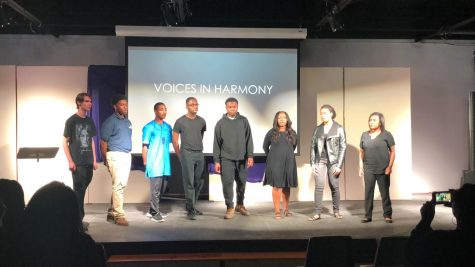
Voices in Harmony singing “Couldn’t Hear Nobody Pray.”
Junior Samantha Anderson said, “The song was a Negro spiritual and came from the days of slavery. The version we did was sung by Wiley College Choir for the Birth of a Nation soundtrack. It’s such a beautiful song , and even though it was hard to get it to where it was on Thursday, I’m very happy we were able to give it justice and make it sound good.”
Lastly, Mia Riddley approached the stage to give the last segment. She delivered a brief presentation that highlighted contributors to African American History that fall under the MSMS core values.
After it was all said and done, Jackson approached the stage and thanked everyone for coming out. While all the participants held hands on the stage, the program was concluded by everyone singing “Lift Every Voice,” or the “Black American National Anthem.”
Crook commended the students on the job that they had done and expressed how proud he was.
“It was a joy helping students craft their skits and practice their performances. Being treated to a variety of information ranging from pre-colonial Africa to Black Lives Matter with music that accentuated each time period, it is hoped that participants and attendees left with new knowledge and a renewed purpose. I look forward to working with students next year as we help MSMS celebrate Black History Month,” Crook said.
BSA announced that they plan on presenting the Black History Program next year as well, but that it will be bigger and better.

